Above: V prays with a finger labyrinth in a “Praying with Your Senses” group.
At Pittsburgh Seminary, we seek to participate in God’s ongoing mission in the world by seeing and getting to know people as our neighbors. Challenged by Jesus’ parable of the Good Samaritan and inspired by Mr. Fred Rogers ’62, who sang, “I have always wanted to have a neighbor just like you!”, I am writing this blog to introduce you to some of my neighbors—students in our Doctor of Ministry (D.Min.) Program, for which I am honored to serve as the director.
I’d like to introduce you to my neighbor the Rev. Kathryn Lester-Bacon, who is currently a chaplain at a continuing care retirement community in Cary, N.C. She previously served as the director of religious life at Duke University Chapel and as a pastor at Second Presbyterian Church, Richmond, Va. She holds an M.Div. degree and is currently a doctor of ministry student in the Reformed Theology cohort at Pittsburgh Theological Seminary, on track to graduate in 2025. For her final project, she is researching and writing about what it means to congregate for worship in a multifaith, transitory context, and how that might help Reformed congregations deepen and strengthen their own work of gathering. Raised by Presbyterian co-pastor parents in Southeastern Pennsylvania, she now lives in Durham, N.C., with her husband and kids. –The Rev. Dr. Donna Giver-Johnston
Neighbors and Change
A neighbor is someone who might change you. This, of course, isn’t the strict etymological definition. However, it is a definition I experience, time and again, out in the world, in my work and life, as well as in stories like the gospels. A neighbor is someone who might change you.
Please note: I said, “might.” We can stonewall our neighbor. We can resist and avoid our neighbor. Still, a neighbor is there, drawing near to us in some way. To have a neighbor—to be a neighbor—means to share a boundary line of some sort. We are adjacent to each other. And thus, we are vulnerable to each other. Because no wall, no matter how fortified, is impermeable or indestructible. A neighbor is someone who might change you. Whether we like it not.
A neighbor is someone who might change you.
Chosen and Unchosen Change
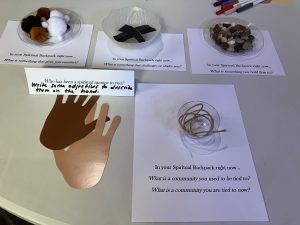
I think about this a lot, because, for nearly half my ordained ministry, I have worked as a chaplain on campuses where people live together as neighbors. On both campuses, people reach a time in life when they choose to move, to leave behind familiar support systems. On each campus, people are stepping into the work of restructuring their norms, their identities, and their relationships. On each campus, people are wrestling with changes to their bodies, grappling with a shifting sense of purpose. On each campus, people are meeting neighbors who are unlike those they used to hang around.
It might surprise you to learn that these two campuses come from the opposite bookends of adulthood: a university campus and a continuing care retirement community. I serve as a chaplain at a continuing care retirement community now; I worked on a university campus prior to this. These particular settings are spaces of privilege, for in both, people choose to join and live together as neighbors.
But still, in both settings, people sometimes chafe at the expectations of community, at the way they have to work around other people. In university and CCRC settings, people are being changed. Whether they want to be or not.
Changing Responsibilities to One Another
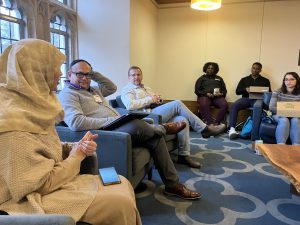
My work as a chaplain in both arenas has been to make space for reflection, discovery, and edification—for people to learn about who they are in this season of life and in this community. Whether the person identifies as Christian or not, I have been trained to walk alongside them for a time and create a container for their own spiritual and emotional work. Sometimes that means utilizing a language of belief, sometimes it means letting someone just complain about how hard it all is.
I’m also called to strengthen the spaces that draw people together. In the past, this has been interfaith graduate retreats and group spiritual direction sessions. Now, I help lead support groups for those with memory loss, Parkinson’s, caregiving responsibilities, and grief. Across the years, I have learned that there is much about these gatherings and people that I cannot control. Still, I believe in the call of making space so that people can ask that most potent of questions: Who is my neighbor? And what is our responsibility to each other in this season of life?
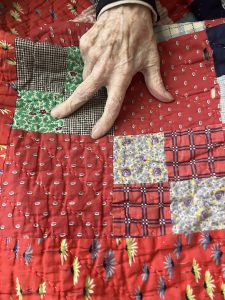
One such example: currently, I am the staff liaison for a group called “Neighbors.” This group is run by a resident—a retired pastoral counselor—who coordinates a group of Independent Living residents volunteering to visit with willing Skilled Nursing residents each month. These Neighbor volunteers meet to encourage and equip each other, to share stories and strategies about their visits with Skilled Nursing residents. One Neighbor realized that, while his healthcare neighbor couldn’t cognitively engage in conversation, if he gave her something to read, she would read it expressively and flawlessly. So, now he makes sure to bring along a worship bulletin to their visits. Another Neighbor offered to play his guitar to those dealing with memory loss, and his music lit up the whole room. Except, they also told him in no uncertain terms that they didn’t want his sad ballads. So, he leans into dance tunes now (his neighbors made him change his tune!). Each of these Neighbors couldn’t say they are “a neighbor” and be done. They had to adjust their care in compassionate and creative ways.
Each of these Neighbors couldn’t say they are “a neighbor” and be done. They had to adjust their care in compassionate and creative ways.
Change Yielding Fruit
It’s a hard thing to do—to ask, “Who is my neighbor?,” to let yourself draw near to another being, to move into the tumbled ground of a new relationship. Becoming a neighbor—acknowledging that you are already a neighbor—opens us up to change and discovery. However, I have seen, across life stage and decade, that by the grace of God, it is in that tilled-over earth that the fruits of the Spirit might bloom.
No matter who we are or where we have been, we can be a neighbor. And, even more surprisingly, we can allow our neighbors to change us.
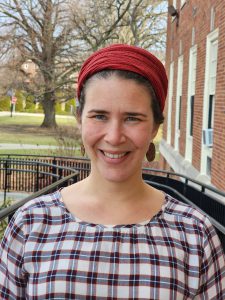
The Rev. Kathryn Lester-Bacon is a chaplain at a continuing care retirement community in Cary, N.C. She previously served as the director of religious life at Duke University Chapel and as a pastor at Second Presbyterian Church (Richmond, Va.). She holds an M.Div. and is currently a doctor of ministry student in the Reformed cohort at Pittsburgh Theological Seminary. For her final project, she is researching and writing about what it means to congregate for worship in a multifaith, transitory context, and how that might help Reformed congregations deepen and strengthen their own work of gathering. Raised by Presbyterian co-pastor parents in Southeastern Pennsylvania, she now lives in Durham, N.C., with her husband and kids.
Read Next
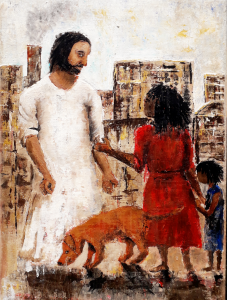

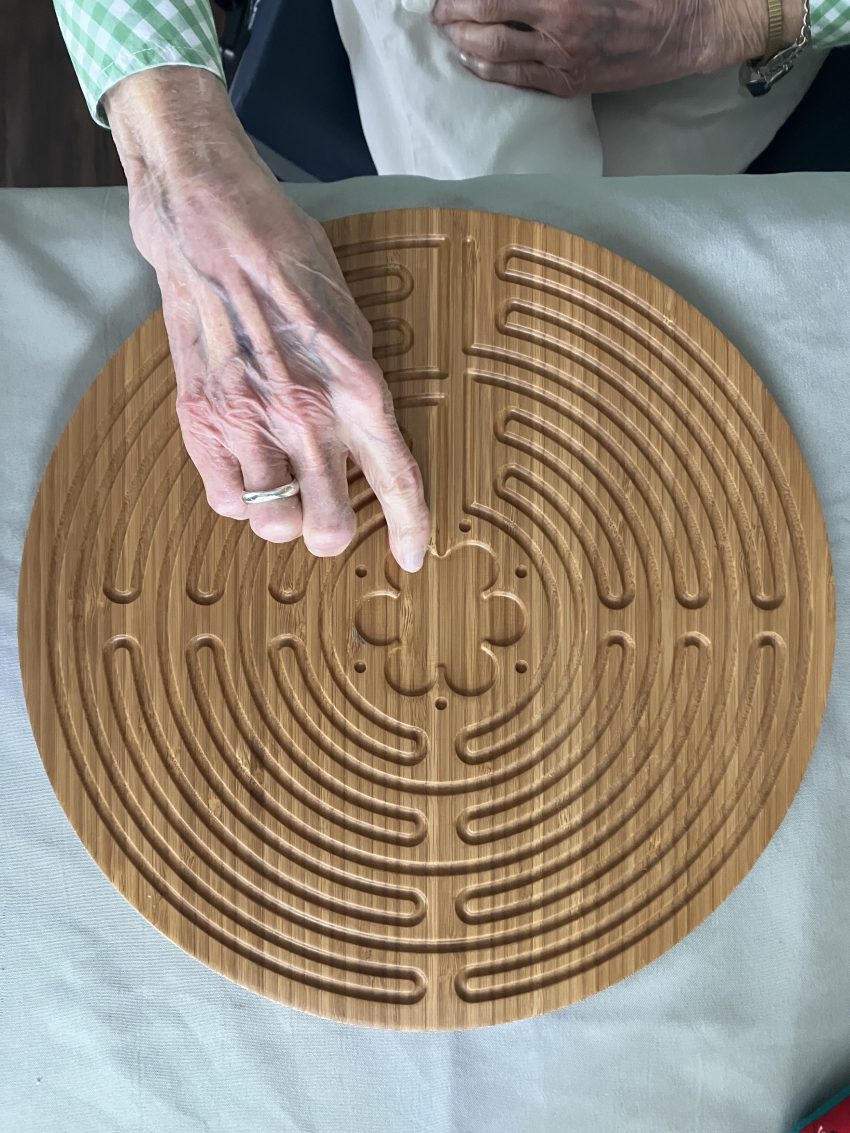

1 thought on “Who Is My Neighbor? The Rev. Kathryn Lester-Bacon on Neighbor, Change, and Mutual Responsibility”